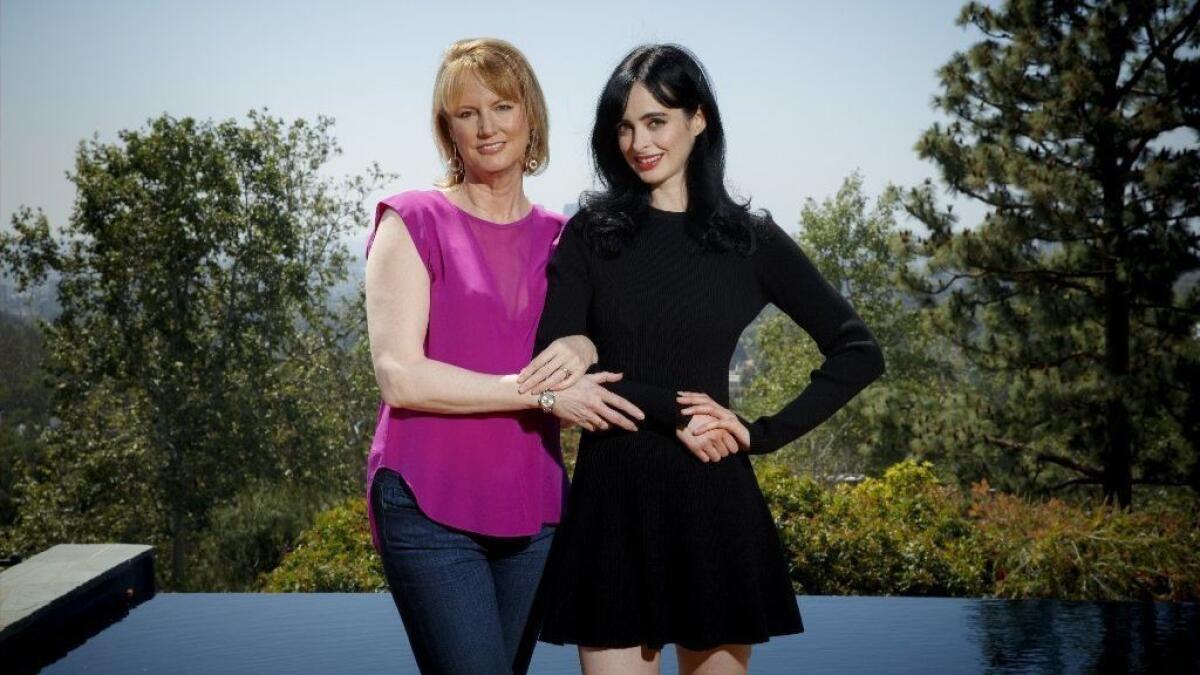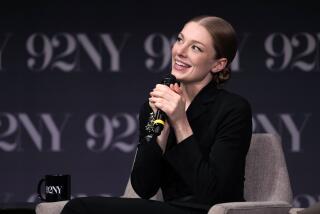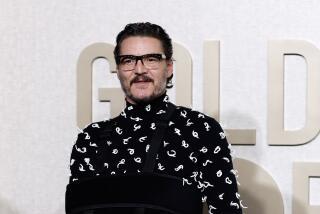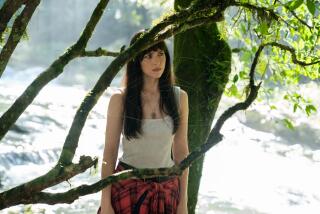Having examined the traumas of the past, the women behind ‘Jessica Jones’ look to the future

The thing that leaps out on first meeting the woman who plays the often-dour, sarcastic superhero “Jessica Jones” is that she’s nothing like Jessica Jones.
“We joke about how different I am,” says Krysten Ritter, grinning. “Every once in a while on set, we’ll do a rehearsal — especially when my boss isn’t there,” Ritter casts some side-eye at showrunner Melissa Rosenberg, laughing beside her on a couch in Rosenberg’s home, “the comedy version or the more Krysten version.”
Rosenberg says to her, “Directors would constantly comment on that, how easily you can drop into the character. She’s a very agile actor anyway. In any one scene, Jessica can go from gut-wrenching sadness to a very dry line.”
Rosenberg, whose “Dexter” collected multiple Emmy and Writers Guild of America nominations, says, “Krysten and I, every script, will do a couple different rounds of notes together. What I often learn is I need less words; she plays so much in her face and body language. Our collaboration is the most creative I’ve had.”
The showrunner frequently calls her star “Ritter,” the actress referring to her as “Mel.” Ritter treasures the friendships she has made on set, recalling moving gestures such as being surprised by crew members on the tour supporting her novel, “Bonfire.” Stories emerge of her stealing rare off-camera moments to knit or bringing a boombox to set and initiating dance parties.
Ritter says, “You get a couple of people into it, and before you know it, there’s 10 people dancing.”
Somewhere, Jessica Jones is rolling her eyes.
Jones has one of the darker histories among Marvel characters. She was orphaned in a car crash. She emerged from the hospital with super-strength, among other abilities, and was taken in by a less-than loving foster mother. Then she suffered an extended period of mind control and violation by the supervillain Kilgrave.
More palpably than in the comics, her persona in the Netflix show is informed by these experiences. On the brightly drawn comic pages, she’s become something of a supermom, with a child, a variety of costumes and monikers, and few visible effects from her trauma. Under Rosenberg and Ritter, she’s just Jessica in a black biker jacket and torn jeans. She’s a hard-drinking, hard-living, scowling, sometimes loose cannon rooted in that trauma.
All those shows, there’s so much you have to live up to and pay attention to. With us, Jessica Jones is really not well known at all.
— “Jessica Jones” showrunner Melissa Rosenberg
Her initial comic appearance came in late 2001, as opposed to the other Marvel leads on Netflix, whose first issues were 44-54 years ago. Rosenberg saw that as an advantage.
“I had it so much easier than the other showrunners,” she says. “Daredevil has canon dating back decades. All those shows, the comics bring so much history and so much fanboy/girl love; there’s so much you have to live up to and pay attention to. With us, Jessica Jones is really not well known at all.”
“She had never been portrayed onscreen,” Ritter adds.
“The character’s also a chick,” Rosenberg says wryly. “So I could pull out the old, ‘Well, as a woman …’ ” Ritter howls as Rosenberg chuckles knowingly.
There are set-piece fights, but the first two seasons have focused on Jones the person rather than Jones the hero. Season 1 concerns her recovery from the Kilgrave trauma. Season 2 finds her coming to terms with her past, including discovering her mother is alive — and kicking (an arc invented for the show).
That focus has paid off. “Jessica Jones’ ” first season collected the most prestigious honor so far for the Marvel Cinematic Universe: The Peabody Award. The show was honored “for deploying a popular genre to ask unpopular questions about power and consent, for constructing such vivid and compelling characters and putting them through the wringer.”
WATCH: Video Q&A’s from this season’s hottest contenders »
Season 2 boasted an all-female roster of directors, including Jennifer Lynch and Uta Briesewitz, veteran cinematographer of “The Wire.” Pilot director S.J. Clarkson, by the way, was announced hours after the interview as the first female director of a “Star Trek” movie.
“Every single one of the directors we had this season were absolute pros, true artists. What changed for me was the experience on set,” says Rosenberg, Ritter nodding. “Often, you’re one of very few women. You begin to feel like an alien on your own set. There was really parity behind the camera. You walk on and everyone’s feeling more comfortable because there’s more balance.”
Season 2 also featured multiple Oscar nominee Janet McTeer as Jessica’s mysterious mother. “It was the best thing ever,” says Ritter. “There was one day when we traded roles to really get underneath the scenes.”
As they gear up for Season 3 (Ritter confirms Jones does not appear in the fourth Avengers movie), showrunner and star aspire “to do something different again,” says Rosenberg. “We’ve delved a lot into her past; maybe this time, we’ll focus on …”
“What happens next,” says Ritter.
“Yeah,” says Rosenberg. “It’s wide open. We can really do anything.”
More to Read
From the Oscars to the Emmys.
Get the Envelope newsletter for exclusive awards season coverage, behind-the-scenes stories from the Envelope podcast and columnist Glenn Whipp’s must-read analysis.
You may occasionally receive promotional content from the Los Angeles Times.






